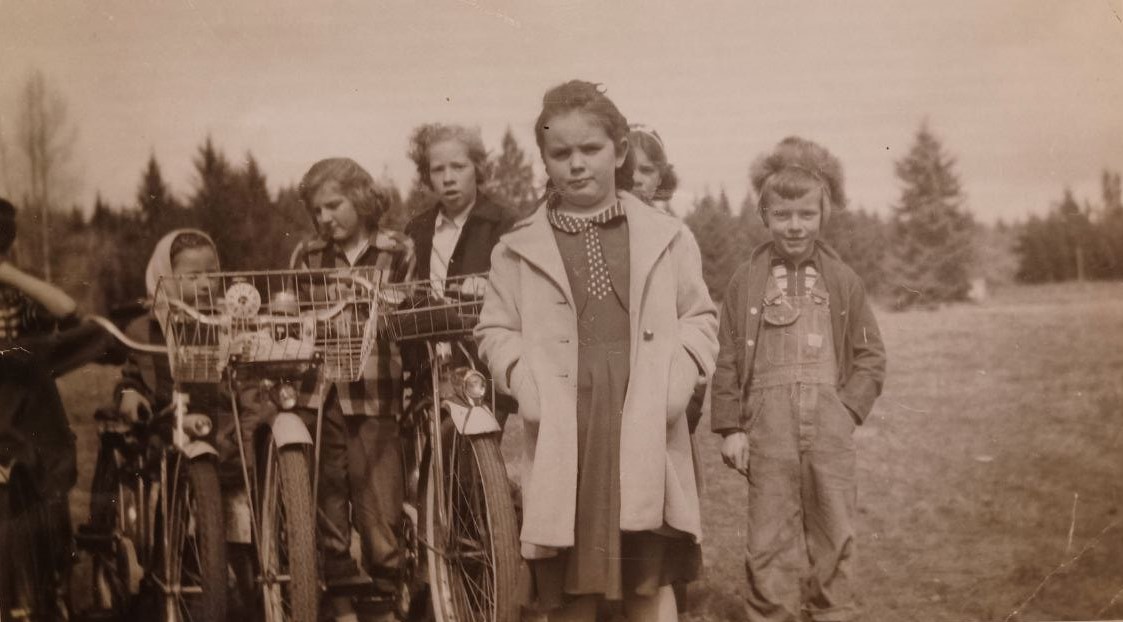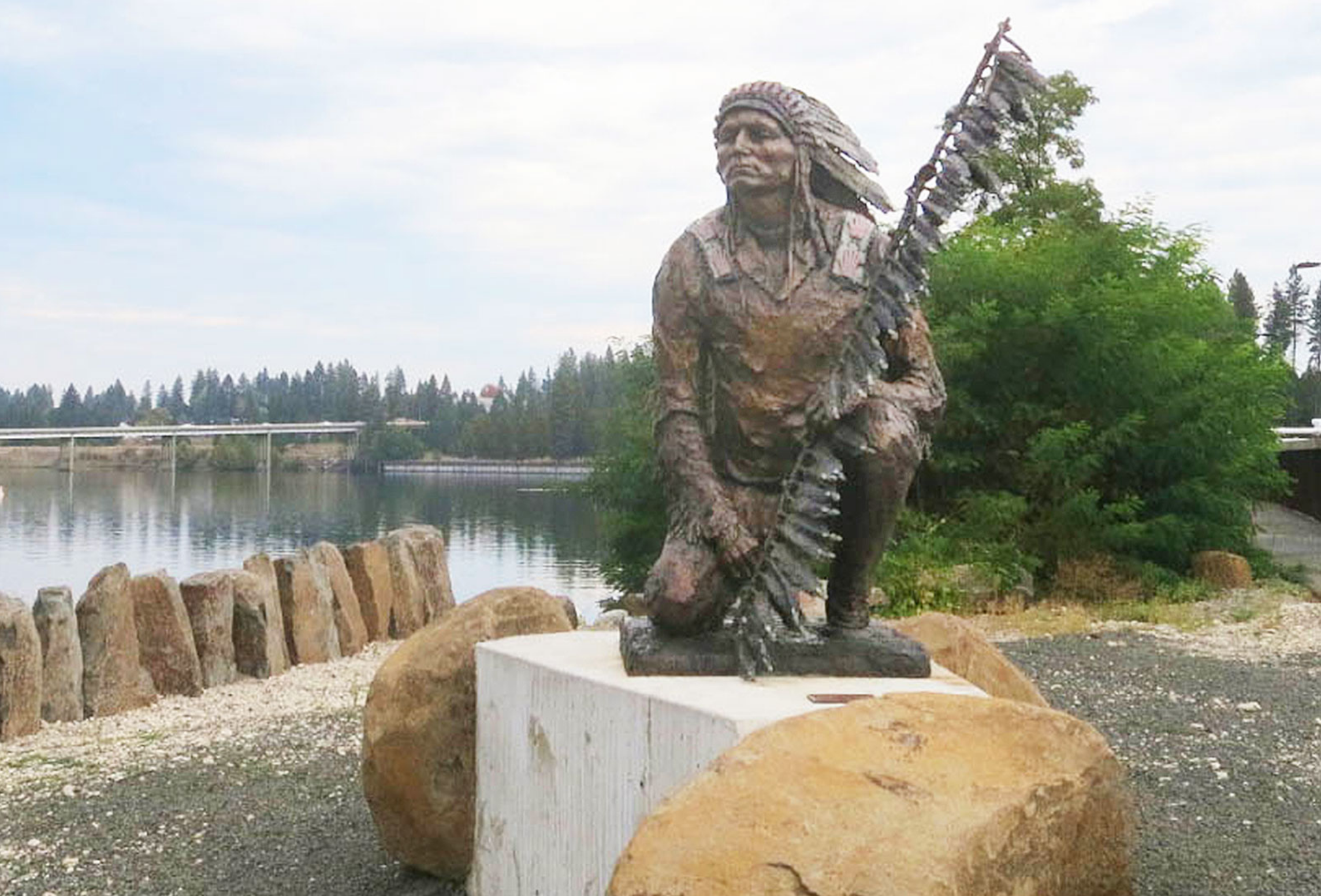The American Family
If you attend Candlelight Christian Fellowship in Coeur d’Alene, odds are you have had the pleasure to meet Miss Ruby Mae, a delightful 82-year-old woman who moved to Idaho three years ago. She maintains a sharp memory and willingly shares fascinating stories from past eras to any listening ear and quips pithy statements faster than most people can think.
The incomparable Ruby Mae was born April 2, 1942, to Newton Philo Newbury and his wife Ruby. Newton named his daughter after her mother and his mother Maude Mae. The couple separated when Ruby was still a young girl, and she remained an only child.
Ruby shared an interesting tidbit concerning her custody when her parents split. At the time, the country was still dealing with war rationing. “My mother had taken me without permission to the Seattle area when I was four,” recalled Ruby. “The judge went with my father to the rationing board and ordered them to give him enough fuel ration cards to make it to Seattle and back to fetch me home.”
“I’m so ornery because my dad raised me,” stated Ruby with a wide grin. She fondly remembers growing up for the first six and a half years near Grand Coulee Dam before moving in 1949 to Humptulips in Grays Harbor County Washington. Her father Newton had worked on the Grand Coulee Dam “from start to finish.” The dam was built from 1933 to 1942 and sits west of Spokane on the Columbia River. It remains one of the largest structures ever built by man and is listed by the American Society of Civil Engineers as “one of the seven civil engineering wonders of the United States.”
Ruby’s interest in the 1800’s western expansion comes from her family roots. Her paternal great-grandmother Martha Rebecca Glenn was born in Arkansas in 1867, the oldest of twelve children. Martha traveled with her family by covered wagon to Council Valley in the Idaho Territory, where she wed Isaac Newton Groseclose in 1885. When Isaac was an 18-year-old lad, an Indian raid resulted in stolen horses. This led his relative Jake Groseclose and three other men to pursue the raiding band, which resulted in the Long Valley Ambush that left Groseclose dead; a historical marker about the ambush can be found in Cascade, Idaho.
The Groseclose family then migrated by covered wagon to Humptulips, which is a Salish word meaning “hard to pole.” Living near her paternal grandparent’s farm was a delight for young Ruby. “I shot my first gun at four years old. My uncle held the rifle, and I pulled the trigger. We shot at Campbell’s soup cans. He was a World War II veteran who fought with Patton.”
She recalls that county fairs were a “to-do” and dances were held in a horse barn. Ruby would bet on sulky races at the track with her grandfather. “I would beat him half of the time, although I would just pick the ones I thought were pretty, like the purple colored sulky,” she smirked. “I would follow grandpa around the ranch all day long.”
Daughter, use your head for more than just a hat rack.
Newton Philo Newbury (1907-1996)
“Grandma was always so good to me, she never got mad,” said Ruby. “She would put my hair up in rags to give it curls.” She has a clear memory of her grandmother using a treadle sewing machine. On one occasion, her grandmother found a large rattlesnake curled underneath the peddle which caused quite a stir until her grandfather took care of it.
During Ruby’s youth, families did not have telephones in the home, nor did they have freezers. “Families rented lockers in town where they could keep frozen goods. It was really something when dad bought our first electric deep freezer which he paid for with overtime wages.” Newton drove a truck for the Bureau of Recreation after the dam project was completed. “There were only three phones in town in 1954 when my grandmother keeled over one morning in the kitchen.” Ruby and her father were there and witnessed her grandmother’s sudden death.



Ruby married at only 16-years-old in 1958. She and her husband Danny had three sons in quick succession. “We lived in a logging town where Danny worked.” She laughed at the idea of working as a young mom like so many of today’s mothers do, and she took haven in her caring for her own home and family. “There was only one place to work in a logging camp, the cook house. My husband was a leader and smart, he provided for the family.” She explained how she knew she wanted to be a mother, but not a “partier” like her own mother was. Ruby’s advice for young women is to behave yourself and to find a good man. “Nowadays, ladies place themselves first and children second, which isn’t the way things should be.” She has similar advice for young men, “behave yourself and find a good woman.”


In 1977, Danny died from cancer in his lungs and pancreas, the boys were 18, 17, and 14 years of age. “Two months from diagnosis to death,” shared Ruby, who remembered shortly before the diagnosis how her husband was sitting in the kitchen smoking, when he suddenly looked at his boys, held up a cigarette, and counseled, “If you are smart, you’ll leave these alone.”
A few years later, Ruby married Gary Bolich and the couple will celebrate their 44th wedding anniversary on November 1. Her faith and love of the Lord have been a central component to her life since both she and Gary came to Christ shortly after they exchanged vows. “Two weeks after marrying Gary, a friend was over and we talked about God and we both accepted Jesus at the same time at the kitchen table.” She takes to heart a warning from the pastor of her church in Humptulips, “Heaven will have people you didn’t think of and missing those you thought would be there.”
When it comes to the marriage vows of ‘for better or worse,’ it’s the worst that gets the better of you.
Ruby Mae Newbury Bolich
Ruby makes no bones about her conservative political leanings. “I have never been a Democrat because I don’t believe in killing babies, and I believe in the Second Amendment and the Constitution. You have to take a stand or you’ll fall for anything,” she asserts. “I wasn’t raised in a Christian family, but God was still there.”
There are four times in her life that Ruby is certain she felt God’s direction and protection, even as a 14-year-old girl, two decades before accepting His gift of grace.
“God woke me up from a deep sleep when I was 14, by causing me to hear a squeak in the floor.” Ruby goes on to explain how she was alone in the home when she woke suddenly to find a male relative walking into the house who did not have permission to be there. “I went and loaded the .22 that I knew how to use, pointed it at him, and told him to leave.” She firmly believes she was saved for harm that day by Providence and her own wits. “The key to survival in a bad situation is to not show fear. Do not panic.”

In adulthood, there were clear moments when she listened to spiritual promptings. In 1993, she accompanied Gary on one of his trucking trips. “We were broken down in Tacoma when I felt an immediate need to return home. I told him ‘I got to go home,’ and even though he didn’t like it, I went home immediately.” She made it back in time to be there when her father had a heart attack. “If I hadn’t been there, he would have died.” Newton lived another three years, leaving this earth in 1996.
Another time, during a road rage incident where a man came up on her in a very aggressive fashion, spewing vitriol and vulgar obscenities, Ruby heard, “Be still and know that I am God.” She remained calm and quiet and stayed in her car as bystanders dealt with the enraged man.
In 2009, while helping her husband during an illness, the spirit of the Lord brought her peace by impressing upon her mind a scripture from Isaiah. “I will be with thee while thou goest through the water.”
God is the author, maker, and finisher of all life.
Ruby Mae Newbury Bolich
Ruby has already buried many loved ones, including her oldest son Roger who died at 54. She believes all life belongs to God, whether we acknowledge that fact or not. Her middle son Carl served 23 years in the U.S. Air Force and moved to the Philippines with his wife Rose after Covid destroyed their finances. “He had been working for Boeing in Seattle until Covid shut everything down,” she said. “Covid was a farce! But you can’t tell a liberal anything.” Her youngest son Ward served in the U.S. Navy and lives nearby.
I wouldn’t want to be in the shoes of anyone whose name isn’t written in the Book of Life.
Ruby Mae Newbury Bolich
Ruby advises fellow believers to be more present and aware of the conditions surrounding them. “You can be so heavenly minded, you forget to deal with earthly life.” As her health declines due to chronic obstructive pulmonary disease (COPD) and congestive heart failure, she remains cheerful and conscientious of the struggles others go through. A dear friend of hers suffered the sudden loss of an adult child. Ruby has a small gift and gentle reminder for her friend, “You are unique and deeply loved by God.”
Ruby’s beautiful soul is grounded in reality, and her practical approach to life has served her well. She believes people today don’t like the truth and forget that, “you shall know the truth and the truth shall set you free.” She longs to share her experiences and memories of forgotten eras and way of life, so she wrote notebooks full of stories to her grandson for his high school graduation. Look for her “Letters to My Grandson” in upcoming Kootenai Journal publications.
Note from Editor-in-Chief Charity Joy — When we lose the connection with past generations, we lose the part of humanity that brings everything into focus. Too often we hear trite sayings about “the greatest generation,” but what does that really mean, and why should we even care?
To be frank, if we measured ourselves against the men and women of my great-grandparent’s era, we would be found lacking in every area of measure. The men and women born in the early 1900’s were fiercely independent, rugged individuals who built the foundations for every convenience we take for granted today. Their skill sets, ingenuity, dedication, reliability, upright character, mental toughness, and generosity of heart would put today’s generation to shame.
When I embarked on this journey to build a local paper that would echo the values of our community instead of attacking them, I knew a key focus would be to bring to life the stories of the forgotten men and women who built this community and others like it all across America.
The American Family section of this publication is where you will venture into the lives of remarkable Americans whose names and faces have been forgotten by all but a few lingering souls, but whose impact on our culture and society still endures.






















